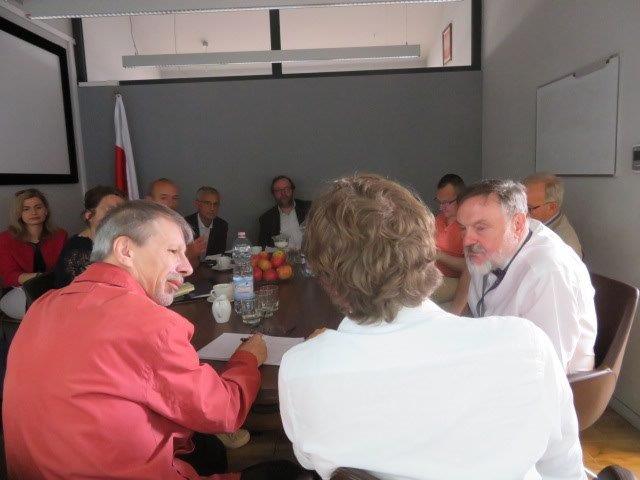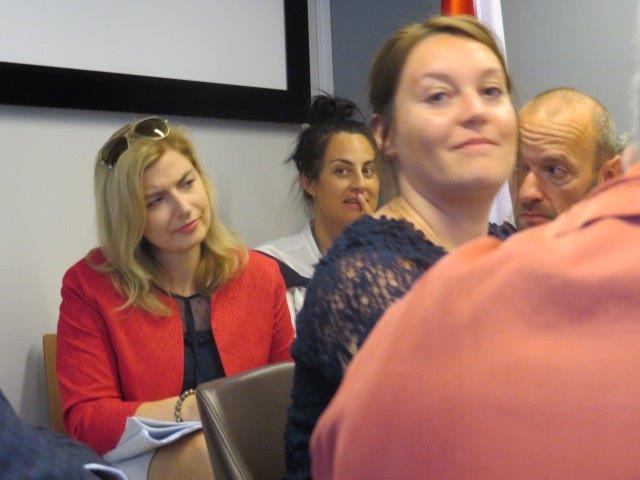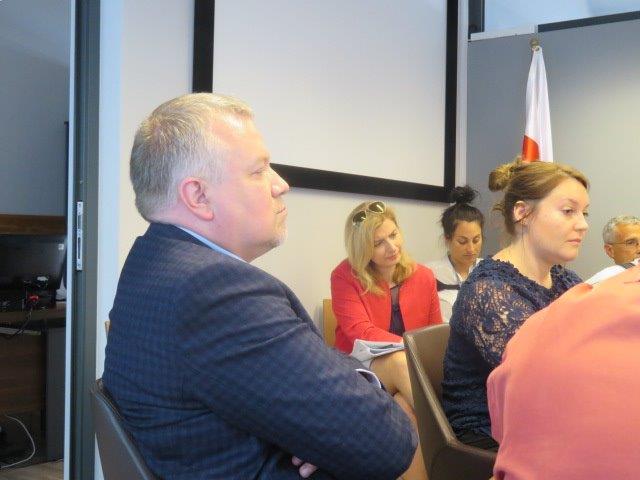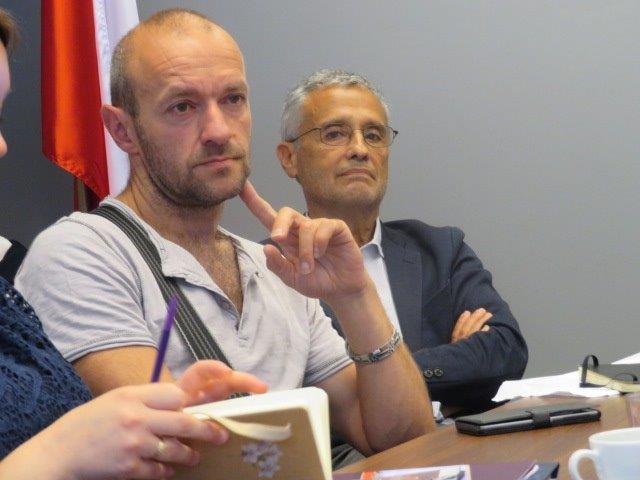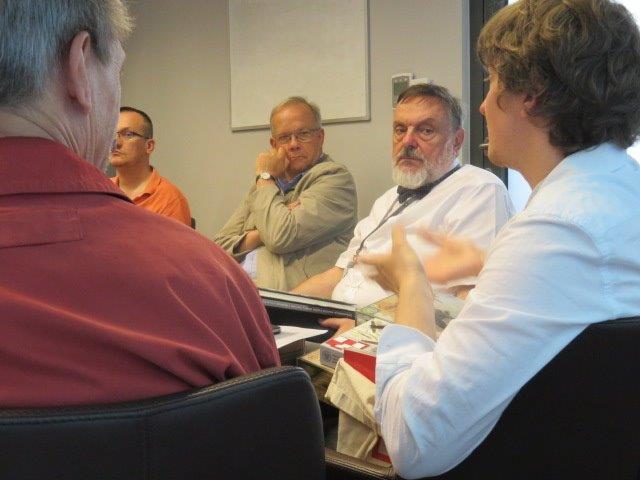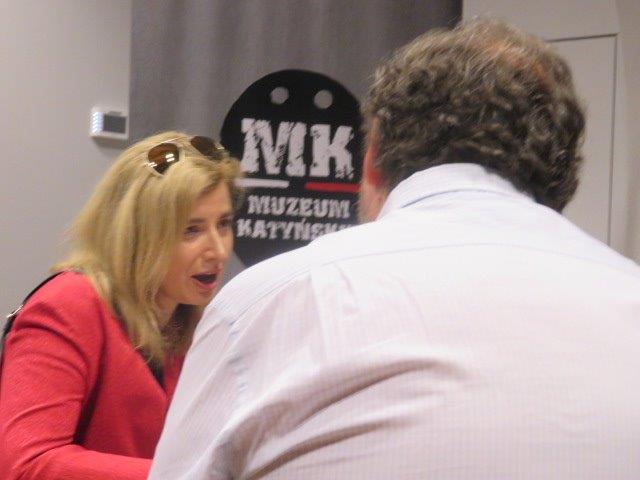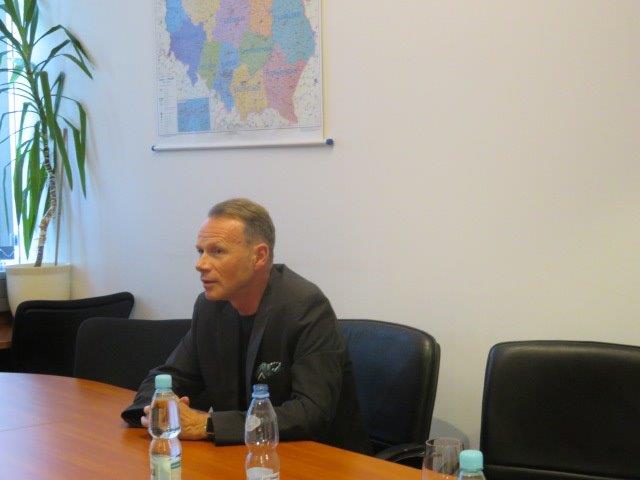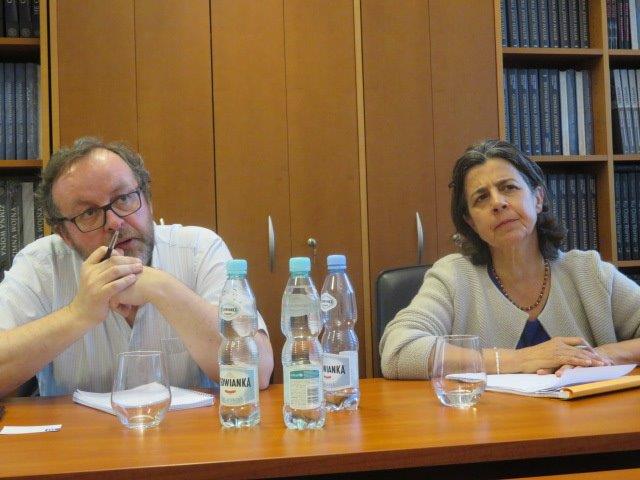On 5 June the guests visited the Katyn Museum in Warsaw. Representatives of the Institute of National Remembrance were invited as well. The following persons participated in the meeting: Director of the Polish Army Museum Dr Adam Buława, head of the Katyn Museum Sławomir Frątczak and Michał Grabowski (Polish Institute in Paris), Philippe Schwartz (Royallieu Museum-Memorial Site ), Régis Le Mer (Resistance and Deportation History Centre in Lyon), Cyrille Delattre ( La Coupole-St-Omer Museum), Aurélie Cousin (Museum of the Resistance and Deportaion in Besançon), Laura Schwartz (Le Guide Juif de l’Europe), Alain Salles (Le Monde), Françoise Pons – independent journalist, François Rousseau (Le Journal des Combattants) and Bernard de la Hamayde (representative of the Department of Aube, Mussy-sur-Seine Museum).
The head of the Division of International Relations at the Office of the President of the IPN Agnieszka Jędrzak presented the Act on the Institute of National Remembrance as a document regulating the Institute's activity, and discussed its structure with the distinction of statutory tasks of eight substantive units. The guests asked about the cooperation between particular offices: as an example, Agnieszka Jędrzak presented the benefits resulting from the cooperation of researchers and archivists with the prosecutorial division.
Presenting the archival resource, she mentioned the recent inscription on the UNESCO list of the original of the Jurgen Stroop Report on the liquidation of the Warsaw ghetto, held in the Archive of the IPN. She also mentioned other important archival documents related to the German occupation, for example, the journal of the Governor General of the Governorship of Hans Frank or the diaries of Johann Paul Kremer, the doctor from the Auschwitz camp. Many of these documents were used as evidence during the Nuremberg trials. A separate group are sources referring to Soviet repressions in Polish lands, including documenting the Katyn massacre. The guests were particularly interested in the camp documentation and access conditions to the IPN resource.
An important part of the presentation was the activity of the Institute of National Remembrance in the international arena, including under the aegis of the International Archival Council, the Platform for European Memory and Conscience, European Network of Official Authorities in charge of the Secret-Police Files or working groups (Ukrainian, Lithuanian, Romanian and Georgian). Mention was also made of the "Warsaw Dialogue for Democracy" co-organized annually with the Ministry of Foreign Affairs, during which the IPN undertakes the issue of transitive justice, which is important for many societies. The subject of the agreement of 2016, regulating the cooperation between the Institute of National Remembrance and the Ministry of Foreign Affairs, including the popularisation Polish history abroad and responding to defamations that harm the good name of the Polish Nation, was also discussed.
At the end of the meeting, the participants received gifts in the form of IPN publications - a book about Captain Witold Pilecki (bilingual version) - a Polish volunteer to Auschwitz sentenced to death by the Stalinist regime, the history of Poland prepared by the Institute of National Remembrance and Ministry of Foreign Affairs in French and a catalog of the Institute's publications on the Holocaust and Polish-Jewish relations during the Second World War.
Representatives of the media - Alain Salles and Françoise Pons - together with Agnieszka Jędrzak also paid a visit to the Chief Commission for the Prosecution of Crimes against the Polish Nation - the headquarters of the IPN investigative division, where their questions were answered in detail by Prosecutor Bogusław Tomasz Czerwiński. The discussion focused on the definition of a communist crime, ongoing investigations and the specifics of the work of the IPN prosecutors. Prosecutor Czerwiński emphasized how important it is to explain all the circumstances of a given crime, even if the alleged perpetrators are no longer alive. He added that we owe it to the victims because, in the rhetoric of communists, they were the perpetrators. He pointed out that the duty of a democratic state is to prosecute such crimes. He also drew attention to the fact that the Second World War is still present in the minds of Poles, as it affected practically all of the citizens of our country, which is why we are struggling with its consequences to this day, both as individuals and a society as a whole. He suggested looking at texts appearing in the foreign media suggesting that the Polish Nation was in any way responsible for establishing and operating concentration and extermination camps in the occupied territories from that perspective – the perspective of Polish sensitivity – especially that it was the Polish State which never collaborated with the German occupant.
Agnieszka Jędrzak emphasized the importance of the so-called transitional justice, in the name of which sentences passed during the communist period, often affecting private and professional lives of the aggrieved parties, were repealed. She also talked about the assumptions of the law regarding former security services functionaries and the de-communization of public space, for example, the removal of Soviet monuments of gratitude.
